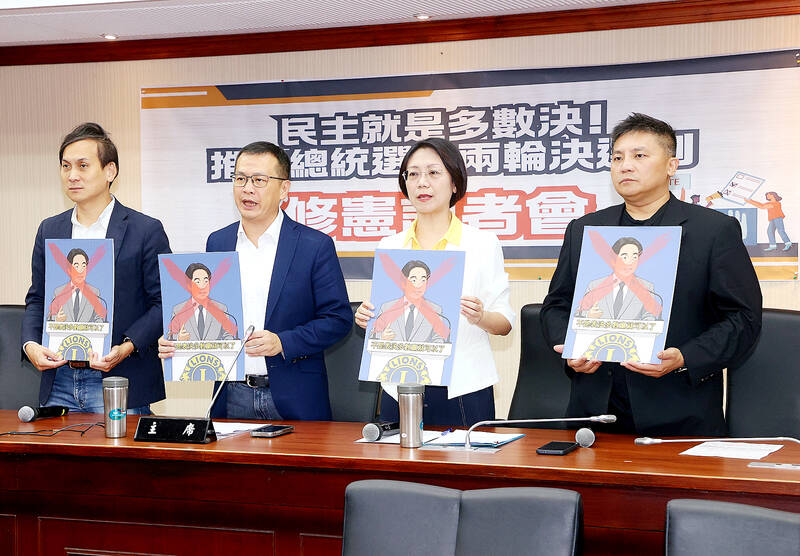Lawmakers from the Chinese Nationalist Party (KMT), Taiwan’s main opposition party, yesterday proposed constitutional and legal changes to create a two-round absolute majority system for electing the president in time for the 2028 election.
KMT Legislator Lo Chih-chiang (羅智強) at a Legislative Yuan news conference said that he, along with KMT lawmakers Yeh Yuan-chih (葉元之), Weng Hsiao-ling (翁曉玲) and Wu Tsung-hsien (吳宗憲), would submit draft constitutional and legal amendments in the new legislative session.
“The proposal has two parts: One is to amend the Constitution to change the presidential election system to an absolute majority two-round system; the other is to revise election laws to resolve the difficulties of minority presidents,” Lo said.

Photo: CNA
Lo was referring to a situation in which one party controls the presidency, but does not command a majority in the legislature.
Such a situation has existed in Taiwan since last year’s election under President William Lai’s (賴清德) Democratic Progressive Party administration.
A two-round presidential vote would allow voters in the first round to “support their favorite candidate without worrying” that strategic voting could “let the most disliked candidate win,” Lo said.
Lo criticized the current plurality system as one that leads to candidates working to split the opponent’s camp and manipulating strategic voting, making voters afraid to support their favorite candidate, which leads to “a very negative election atmosphere.”
The changes could improve the election atmosphere and would strengthen the president’s legitimacy, he said.
Most KMT lawmakers support the reform, Lo said, adding that he has privately exchanged views with Taiwan People’s Party lawmakers and would continue to work to build cross-party consensus.
Weng said that “more than 70 percent of the more than 40 countries with direct presidential elections adopt a two-round system.”
In contrast, the current system lets a president win “without obtaining more than half of the votes,” Weng said.
Although a two-round presidential vote might increase election expenses, it is “worth it” from the perspective of democratic legitimacy and political stability, Wu said.
The reforms would encourage presidential candidates to “move toward the center, compromise and moderate,” and help Taiwan “avoid constant confrontation and division, and move toward harmony and unity,” Yeh said.

Alain Robert, known as the "French Spider-Man," praised Alex Honnold as exceptionally well-prepared after the US climber completed a free solo ascent of Taipei 101 yesterday. Robert said Honnold's ascent of the 508m-tall skyscraper in just more than one-and-a-half hours without using safety ropes or equipment was a remarkable achievement. "This is my life," he said in an interview conducted in French, adding that he liked the feeling of being "on the edge of danger." The 63-year-old Frenchman climbed Taipei 101 using ropes in December 2004, taking about four hours to reach the top. On a one-to-10 scale of difficulty, Robert said Taipei 101

A preclearance service to facilitate entry for people traveling to select airports in Japan would be available from Thursday next week to Feb. 25 at Taiwan Taoyuan International Airport, Taoyuan International Airport Corp (TIAC) said on Tuesday. The service was first made available to Taiwanese travelers throughout the winter vacation of 2024 and during the Lunar New Year holiday. In addition to flights to the Japanese cities of Hakodate, Asahikawa, Akita, Sendai, Niigata, Okayama, Takamatsu, Kumamoto and Kagoshima, the service would be available to travelers to Kobe and Oita. The service can be accessed by passengers of 15 flight routes operated by

Taiwanese and US defense groups are collaborating to introduce deployable, semi-autonomous manufacturing systems for drones and components in a boost to the nation’s supply chain resilience. Taiwan’s G-Tech Optroelectronics Corp subsidiary GTOC and the US’ Aerkomm Inc on Friday announced an agreement with fellow US-based Firestorm Lab to adopt the latter’s xCell, a technology featuring 3D printers fitted in 6.1m container units. The systems enable aerial platforms and parts to be produced in high volumes from dispersed nodes capable of rapid redeployment, to minimize the risk of enemy strikes and to meet field requirements, they said. Firestorm chief technology officer Ian Muceus said

MORE FALL: An investigation into one of Xi’s key cronies, part of a broader ‘anti-corruption’ drive, indicates that he might have a deep distrust in the military, an expert said China’s latest military purge underscores systemic risks in its shift from collective leadership to sole rule under Chinese President Xi Jinping (習近平), and could disrupt its chain of command and military capabilities, a national security official said yesterday. If decisionmaking within the Chinese Communist Party has become “irrational” under one-man rule, the Taiwan Strait and the regional situation must be approached with extreme caution, given unforeseen risks, they added. The anonymous official made the remarks as China’s Central Military Commission Vice Chairman Zhang Youxia (張又俠) and Joint Staff Department Chief of Staff Liu Zhenli (劉振立) were reportedly being investigated for suspected “serious